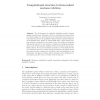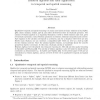25 search results - page 4 / 5 » Formal Properties of Constraint Calculi for Qualitative Spat... |
ECAI
2010
Springer
13 years 2 months ago
2010
Springer
Bipolarity is an important feature of spatial information, involved in the expression of preferences and constraints about spatial positioning or in pairs of opposite spatial relat...
COSIT
2001
Springer
13 years 9 months ago
2001
Springer
The development of cognitively plausible models of human spatial reasoning may ultimately result in computational systems that are better equipped to meet human needs. This paper e...
COSIT
2001
Springer
13 years 9 months ago
2001
Springer
Abstract. The Double Cross calculus has been proposed for the purpose of navigation based on qualitative information about spatial configurations. Up until now, however, no result...
SEBD
2003
13 years 6 months ago
2003
The Ambient Logic is a modal logic proposed to describe the structural and computational properties of distributed and mobile computations. The static part of the Ambient Logic is,...
AIR
2005
13 years 5 months ago
2005
Qualitative temporal and spatial reasoning is in many cases based on binary relations such as before, after, starts, contains, contact, part of, and others derived from these by r...


